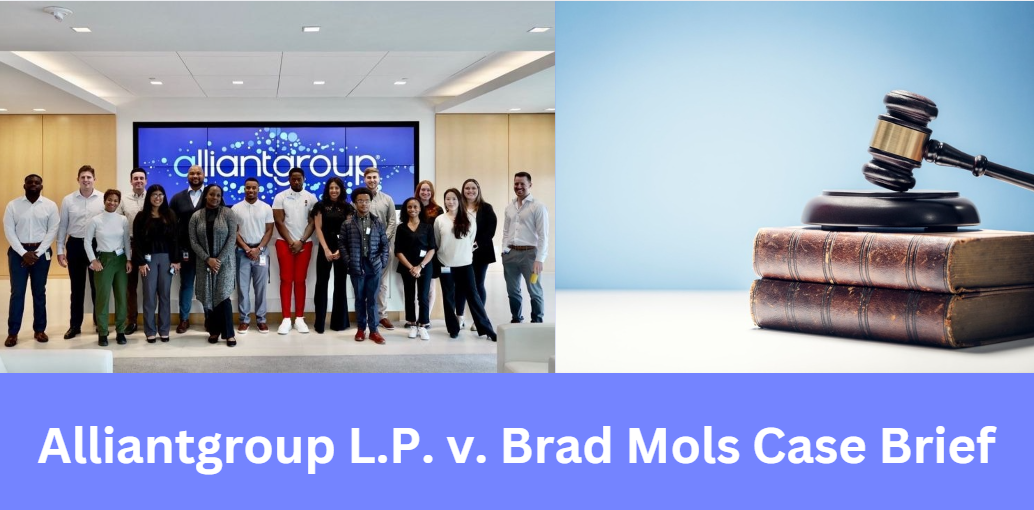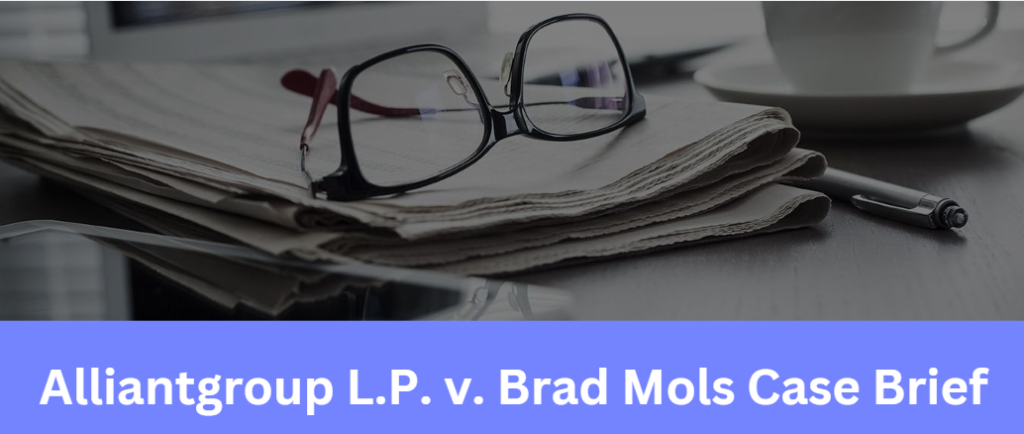
Introduction

The Alliantgroup L.P. v. Brad Mols case brief represents a pivotal legal confrontation in corporate law, focusing on the enforcement of employment contracts, the safeguarding of trade secrets, and the limitations of non-compete agreements.
Filed in the Southern District of Texas, this case has become an essential reference for understanding how businesses defend their proprietary assets in disputes with former employees.
This article provides a comprehensive examination of the case, unpacking its background, legal issues, court proceedings, and broader implications for businesses, employees, and legal professionals.
Case Background

The case started when Alliantgroup L.P., a well-known tax consulting firm, sued its former employee, Brad Mols, for violating some of the most important clauses in his employment contract.
These clauses included non-compete agreements and confidentiality obligations designed to protect the company’s trade secrets.
The allegations claimed that Mols had taken proprietary data and confidential client information upon leaving the company, which was potentially a threat to the competitive advantage of Alliantgroup.
As a firm relying heavily on proprietary knowledge, the misuse or misappropriation of such information could have serious implications.
At the heart of the Alliantgroup L.P. v. Brad Mols case brief were issues related to:
- Employment contract enforcement.
- Protection under the Texas Uniform Trade Secrets Act (TUTSA).
- Reasonableness of non-compete clauses in Texas law.
Legal Issues in the Alliantgroup L.P. v. Brad Mols Case Brief

This case raised several important legal questions that have implications for corporate governance and employment law:
Breach of Contract
Alliantgroup argued that Brad Mols had knowingly violated the terms of his employment agreement, which explicitly restricted him from disclosing or using sensitive company data after his departure.
Misappropriation of Trade Secrets
A central point in the lawsuit was the accusation of misappropriating trade secrets. Under TUTSA, companies are entitled to protect confidential business information that gives them a competitive edge.
Validity and Enforceability of Non-Compete Agreements
Non-compete clauses were critical in the case. Alliantgroup contended that Mols had violated these restrictions by engaging in activities that could harm its business. However, Texas law requires such agreements to be reasonable in scope, geography, and duration.
Injunctive Relief
Alliantgroup sought injunctive relief to prevent Mols from using or sharing any proprietary information until the court reached a final decision. This legal mechanism is often critical in cases involving intellectual property.
Alliantgroup’s Claims
Alliantgroup’s legal strategy focused on:
- Highlighting the irreparable harm that could result if trade secrets were disclosed or used.
- Providing evidence of Mols’ access to proprietary information during his tenure.
- Enforcing the validity of the restrictive covenants signed by Mols.
The company emphasized that its success relied on the confidentiality of its tax strategies, methodologies, and client data, all of which Mols was privy to during his employment.
Brad Mols’ Defense
Mols denied the allegations and challenged the validity of the non-compete clause, arguing:
- The agreement was overly broad and imposed unreasonable restrictions on his ability to earn a livelihood.
- Alliantgroup failed to present concrete evidence proving misappropriation or misuse of trade secrets.
His defense highlighted the complexities of balancing employee rights with employer protections, particularly under Texas employment law.
Court Proceedings
In the Alliantgroup L.P. v. Brad Mols case brief, the court examined multiple factors:
- Whether Alliantgroup’s trade secrets met the legal definition of confidential information under TUTSA.
- The reasonableness of the restrictive covenants in the employment agreement.
- The likelihood of harm to Alliantgroup if Mols were allowed to continue his activities.
The court initially issued a temporary injunction, restricting Mols from using any potentially misappropriated information. This step highlighted the judiciary’s cautious approach in balancing the claims of both parties while preserving the integrity of sensitive data.
Broader Implications

The Alliantgroup L.P. v. Brad Mols case brief has significant implications for businesses, employees, and legal practitioners:
For Businesses
Employers must have their contracts enforceable with well-tailored non-compete clauses that meet legal standards. Proactive steps such as securing sensitive information and carrying out regular compliance audits must be undertaken.
For Employees
Employees must be keen and understand the terms of the employment agreement especially non-compete and confidentiality clauses before signing the agreements.
Legal Professionals
The case of the day emphasizes the need for clear evidence in trade secret litigation and the importance of well-drafted restrictive covenants. It shows how employment law in Texas is also evolving.
FAQs
What is the significance of the Alliantgroup L.P. v. Brad Mols case brief?
This case highlights the importance of trade secret protection and the enforceability of non-compete clauses in employment agreements under Texas law.
What are trade secrets under Texas law?
Trade secrets include confidential business information that derives economic value from not being publicly known and requires reasonable efforts to maintain secrecy.
Why are non-compete clauses controversial?
Non-compete clauses often face scrutiny because they can limit an individual’s ability to work, raising questions about their reasonableness and enforceability.
Conclusion
The Alliantgroup L.P. v. Brad Mols case brief is a prime example of the overlap between employment law and corporate governance, focusing on the difficulties faced by businesses in safeguarding their competitive advantage and the legal recourse for enforcing contractual obligations.
Through this case, businesses and employees have learned the importance of an agreement and the effects of any legal dispute over proprietary information.
For further insights or legal analysis of this article, let me know, and I will definitely expand it to meet whatever requirements you may need.
Affiliated Posts Like Alliantgroup L.P. v. Brad Mols Case Brief
Subaru Legacy Parking Brake Release Button Location 2011: Everything You Need to Know
PVC Hidráulico 32 mm Hidroquillón: A Comprehensive Guide to Quality Hydraulic Piping
TTW Interesting NPCs Where is Alicia’s Shack: Uncover the Secrets of a Hidden Wasteland Location





